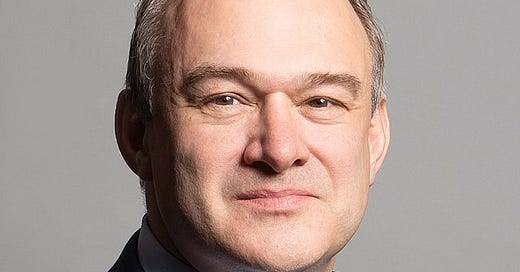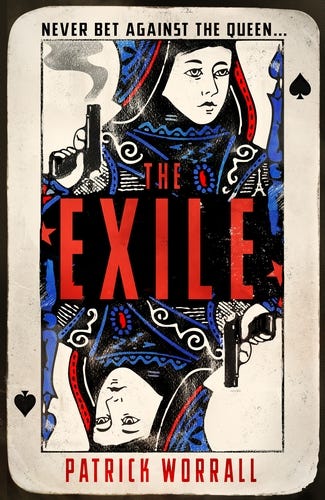That Ed Davey Speech today
Ed Davey delivered a strong speech at the Liberal Democrat conference today, revealing a compassionate leader driven by personal experience. He has taken the Liberal Democrats into a new era, securing a record 72 seats in the recent general election and marking their place as a significant force in UK politics. But with this success comes a pressing question: have they reached their peak, or can they achieve more?
The Labour Party and the Liberal Democrats share many common values and approaches to the economy and society. Isn't it time we acknowledged this and worked more closely together? Davey’s focus on health and social care, rooted in his personal experience as a carer, shows his deep commitment to tackling one of the nation's pressing issues. His criticism of previous Conservative and Labour governments for neglecting carers resonates, and he has every right to engage more deeply in addressing the social care crisis.
As a party leader tempered by time in office and with a track record of making tough calls, Davey is charting a course that emphasises a new focus on community services and a more resilient NHS. He rightly points out that "making the NHS winterproof" requires investment and a shift from stumbling from crisis to crisis. It's a call to action that we in Labour take seriously. If Davey distinguishes his party by prioritising health and social care, we should at least strive to understand his demands.
In the '90s, I was one of those in the Labour movement who resisted aligning with the Lib Dems. As a young political officer at the Amalgamated Engineering Union, we campaigned hard against the idea of closer ties with a party many working-class people viewed as just too liberal. Back then, the trade union link to Labour in Westminster was much stronger. For the former Liberal and SDP members in the Liberal Democrats, it was seen as a significant barrier to closer ties.
A quarter of a century later, you've only got to look at how Sharon Graham of Unite speaks of Labour to know that things have changed. Sure, Labour can point to its collective roots, contrasting with individual liberty that underpins the Liberal Democrats' roots. But in a world of greater individual rights, are these deal-breakers to working closer together?
So, what are the current barriers to a potential alliance? The Lib Dems are understandably wary after being burned by their coalition with the Tories and the past lack of progress with Labour. Despite this reluctance, it's time for Labour to take the initiative. Figures around the cabinet table and many other Labour members hold Davey in high regard. By acknowledging his right to work with us on social care, we can build the trust needed to work toward real change.
Both parties now face the challenge of ensuring their recent successes are not just a high-water mark but the foundation for future gains. The Liberal Democrats have carved out a strong position on health and social care, but whether they can sustain and build on this momentum remains to be seen. Their rise has been partly due to tactical voting, with Labour supporters lending their votes to unseat Conservatives, and vice versa. But how long will this goodwill last?
Perhaps it’s time to face the facts. The Liberal Democrats may have reached their electoral ceiling without a closer alignment with Labour. The country's anti-conservative sentiment could be the key to forging a partnership that taps into the potential for a true progressive alliance.
Ultimately, both parties will regret not working harder to understand each other's positions earlier in this Parliament. The answer could shape the future of British politics and the nation itself. Let's take the opportunity to collaborate, starting with the issues that matter most: health, social care, and a vision for a fairer society.
Books
Patrick Worrall’s The Exile is a gripping thriller that deftly blends political intrigue with a riveting storyline. Worrall’s latest novel captivates the reader from the first page, drawing them into a world of espionage and suspense and delving into the depths of isolation
Worrall deftly constructs a world where trust is the rarest commodity, crafting an emotionally gripping and morally complex tale. Set in the shadows of Cold War espionage in postwar Europe, The Exile introduces readers to Greta, a young Lithuanian freedom fighter thrust into a life-threatening mission in the West. This broken continent, teeming with ex-Nazis, Soviet spies, and ruthless criminals, forms the treacherous landscape she must navigate. Worrall’s genius lies in his portrayal of Greta, a woman motivated by a cause far greater than herself, operating in a world where allies and enemies blur.
Worrall’s Greta subverts the female rage archetype in literature. Her cold determination stems from an essential mission, making her a standout character. The patchiness of my reading must be responsible for the conclusion that Greta is one of the most credible politically motivated women in contemporary fiction. Is it me, or is it that female characters of this magnitude are so rare in the historical fiction genre?
The joy of Worrall’s books goes beyond characterisation. He creates a vivid, almost cinematic experience for the reader. His suspense is relentless, and his prose is so bleakly evocative that it leaves one on edge, uncomfortable yet compelled to continue. There is a grim beauty in this unflinching portrayal of loyalty, betrayal, and the cost of war.
The Exile is a must-read for those who enjoy high-stakes narratives with nuanced characters. However, it unfolds like a thriller; its emotional depth and historical context elevate it beyond the genre. Worrall is a master of language, immersing the reader in the harsh realities of postwar Europe, making this book feel like a blockbuster movie in waiting.




